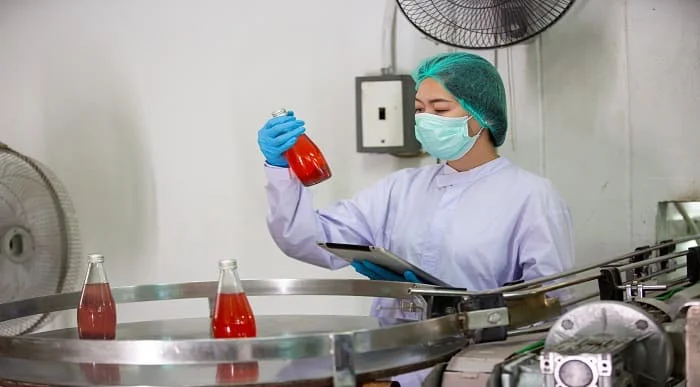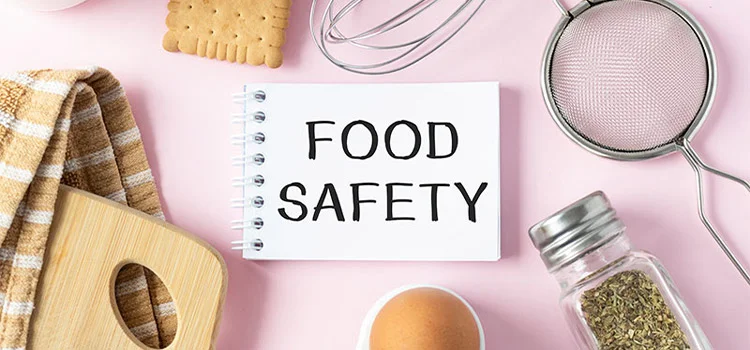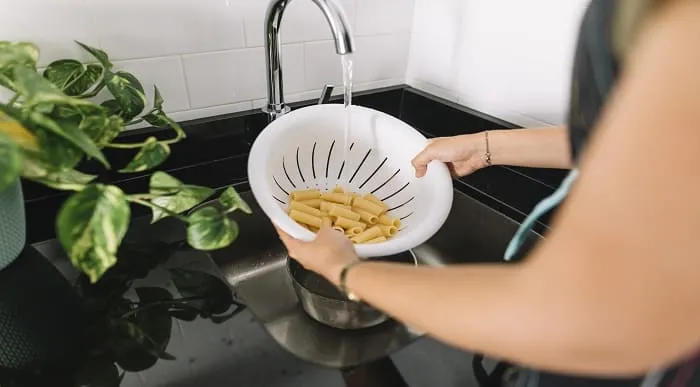Food Hygiene & Safety
How Long Does a Level 2 Food Hygiene Certificate Last
The short answer is- indefinitely. A Level 2 Food Hygiene Certificate doesn’t expire. But the standard practice in the industry is to renew your certificate every three years.
No, it’s not just a random number that the food industry has come up with. It’s rather a careful, calculated outcome of observation of the people that work in this industry.
Let me explain. But first, a bit of context may provide you with some invaluable insights into the food industry.
Table of Content
- What is a Food Hygiene Certificate?
- Food Hygiene Certificate Levels
- Food Hygiene Training & Legal Requirements
- Frequently Asked Question [FAQ]
- Does a Level 2 food hygiene certificate expire?
- Do you need a level 2 food hygiene certificate?
- What can you do with a level 2 food hygiene certificate?
- How do you get a level 2 food hygiene certificate?
- How often should a food hygiene certificate be renewed?
- Is a food hygiene certificate required by law?
- Conclusion
- What to Read Next:
What is a Food Hygiene Certificate?
The most widely recognised qualifications are the three levels of Food Hygiene Certificates. They are also the most popular. Whether you work in a kitchen, a production line or even in retail- if you work with food and handle them regularly, then you’ll need a Food Hygiene Certificate.
Which one you’ll need depends on your level of involvement with food though.
Food Hygiene Certificate Levels
As stated before, there are three levels to Food Hygiene Certificates. Which certificate you’ll need depends largely on what job role you’re currently assuming.

Level 1
Level 1 only covers basic hazards. It provides awareness of risks associated with low-risk food. Most of the basic principles of food hygiene are also included here. Topics such as-
- Personal hygiene
- Food poisoning
- Pest control
- Cross-contamination
- Food storage
- Temperature control
- Waste disposal
It is aimed at supervised front-of-house or bar staff and any other employees who don’t directly prepare or handle any food. People that need a Level 1 Food Hygiene Certificate include, but are not limited to-
- Front of House (FOH) employees such as- the hosts and the hostesses, server, food runner, busser, sommelier, headwaiter/head waitress, general manager, FOH manager etc.
- Waiters
- Kitchen porters
- Bartenders and bar-backs
- Food delivery drivers
- Checkout staff
Level 2
As Level 2 Food Hygiene Certificate means you have an excellent understanding of all aspects of food hygiene, it is by far the most widely used and recognised. It’s for people who directly handle food and the chefs. You may think that the law applies only to people who work in restaurants. But that’s not the case.
For example, you may work in a school cafeteria where the lunch is free for the students. You’ll still need a Level 2 Food Hygiene Certificate to work as a staff where food is cooked or prepared. In fact, there are a lot of places where you may handle food directly.
You’ll need a Level 2 certificate in all these places. In short, anyone working in the catering and hospitality industry will need a certificate to continue working there. These roles and include-
- Cooks, chefs & baristas
- Kitchen and catering assistants
- Teachers, nursery staff and those working with children
- Support workers, care workers and those working with vulnerable people
Level 3
Level 3 is aimed at people who are-
- Managers
- Implementing food safety policies
- Supervising food preparation

Level 1 Food Hygiene and Safety Course for Manufacturing
- Accredited Courses
- Tutor Support Included
- 3 Installment Plan at checkout
- 14 Days Money Back Guarantee
How Long Does It Take to Complete the Food Hygiene Certificate Course?
Most of the Food Hygiene Courses are pretty quick to complete. They are also relatively affordable. Since the laws regarding these courses are a bit relaxed when it comes to the manner of how these trainings are received, they can be done online. So as you can imagine, you can do them at your own pace.
But relatively speaking, a Level 1 course may take 1 hour of training, while Level 2 may offer you 1-2 hours of training. However, Level 3, may require up to 10+ hours of training to be completed.
Know that some providers offer courses such as Food Hygiene at Home, which only provides general education on food hygiene and safety.
Food Hygiene Training & Legal Requirements
One common question is that if food hygiene training is a legal requirement.
In Europe & the UK, the answer is yes.
If you’re in the food business in the UK, you have a legal responsibility to properly train your staff in good food hygiene practices. There will be routine inspections sent to your business from the Environment Health office. When an officer visits and inspects your premises, you must be able to provide evidence of this training of the entire relevant staff.
Top Courses of this Category
How Long Does a Food Hygiene Certificate Last?
We can also rephrase this question to “How Long Does a Level 2 Food Hygiene Certificate Last?” as most learners prefer going for a level 2 course and the answer will still be the same: indefinitely.
As discussed in the introduction, food hygiene certificates do not expire. According to The Food Safety (General Food Hygiene) Regulations 1995, food handlers must be-
“trained in food hygiene matters commensurate with their work activities”.
Your training also has to comply with food hygiene legislation, such as the Food Hygiene Regulations 2006 and the Food Safety Act 1990.
To quote the Food Standards Agency–
“There is no legal requirement to attend a formal training course or get a qualification, although many businesses may want their staff to do so. The necessary skills may also be obtained in other ways, such as through on-the-job training, self-study or relevant prior experience.”
This is all that is required by law. There is no recommendation on how often this has to be repeated. However, repeating the course every 3 years will help you stay up-to-date with the changes in the industry and will also accelerate your career prospects.
But, in the UK, the industry wide practice is that the businesses have to ensure that their workers have up-to-date food hygiene knowledge. To achieve this, all food businesses have to retrain their employees every 3 years.Environmental Health officers also recommend that refresher training is provided regularly and that it fits in with the risk assessment that relates to your particular business.
What Does Food Hygiene Training Cover & Why is Renewing Training Important?
As we’ve already discussed, Level 2 Food Hygiene Training is the most common one in the food and catering industry. The course covers all the training materials covered in Level 1 but in a lot more detail. Level 3 covers the management of the staff as well.course
For the sake of brevity and relevance, let’s discuss what is covered in a Level 2 Food Hygiene Training here.
- Food hygiene and safety legislation of both UK & EU
- The four types of hazards:
- Microbiological
- Allergenic (caused by food allergens)
- Physical
- Chemical
- Cause of contamination and its prevention
- Proper preparation and storage procedures as well as controlling food temperature
- Personal hygiene
- Maintaining high standard of cleanliness and controlling pests
- Depending on the course, you’ll also learn about Hazard Analysis and Critical Control Point (HACCP), a system that helps businesses safely handle food.
As for why the renewing of the certificate is essential, it’s to make sure that you stay on top of any legislation changes all the time. Legislative changes in the food sector can and does change all the time. Science never sits idle. As food safety and the general health sector associated with it gets updated every so often with new discoveries and studies, so do the laws behind them.
So, to ensure that your business follows the latest trends and doesn’t compromise on quality as well as safety, retraining your entire staff and yourself is vital.
Frequently Asked Question [FAQ]
Does a Level 2 food hygiene certificate expire?
No, a Level 2 food hygiene certificate doesn’t expire. However, it is always advisable to take a refresher course every three years to match up with modern safety practices.
Do you need a level 2 food hygiene certificate?
The Level 2 Food Hygiene Certificate is meant for those who work directly with food as well as chefs. If you’re one of those persons, you definitely should get one as early as possible.
What can you do with a level 2 food hygiene certificate?
The level 2 course is strongly recommended for food handlers working in restaurants, takeaways, pubs, cafes, guest houses, hotels, schools, works canteens, nurseries, care homes, or any place else where food is produced or handled.
How do you get a level 2 food hygiene certificate?
To get a Level 2 Food Hygiene Certificate in the UK, you typically need to complete a training course and pass an exam. The course can be taken online or in-person and covers topics such as food safety legislation, temperature control, food handling practices, and cleaning and disinfection. After completing the course, you’ll need to pass a multiple-choice exam to receive the certificate.
How often should a food hygiene certificate be renewed?
You don’t have to renew your certificate. Once you get it, it lasts indefinitely. However, do take a refresher course every three years to keep up with modern safety practices.
Is a food hygiene certificate required by law?
If you’re in the food business, yes, you do need to take a food hygiene training course (and management system, if it applies to you) and earn a certificate after completing the course.
Conclusion
To recap, a Level 2 Food Hygiene Certificate will last your entire lifetime. But if you want to follow the industry-wide standard, it’s best if you renew your training every 3 years.
If you don’t, it’ll demonstrate that you really don’t care about the quality of service that you provide to your customers.
This can really hurt your business. So to stay relevant, make sure that your business doesn’t fall behind on safety standards and best practices.
What to Read Next:
- How to Become a Chef in the UK and Worldwide – Difference Include
- Can You Reheat Rice? What is The Science of Reheating Rice
- Food Safety Management System: Step by Step Complete Guide
- Health Safety and Hygiene Rules to Follow in the Kitchen
- Can You Reheat Chicken? Storage, Defrosting and Reheating Techniques
- 7 Baking Tools and Equipment – A Complete List
- What is the Difference between Chef and Cook











